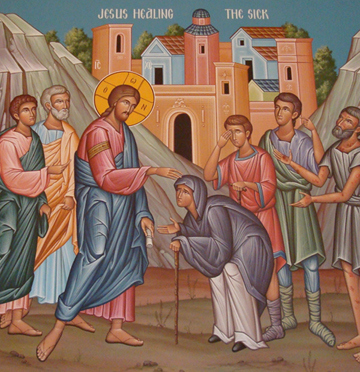|
|||
|---|---|---|---|
| This weekly bulletin insert complements the curriculum published by the Department of Christian Education of the Orthodox Church in America. This and many other Christian Education resources are available at http://dce.oca.org. | |||

The Church gives equal honor to each of the Seventy Apostles, and their icon shows them all together. This grouping of saints is called a "synaxis." We also commemorate apostles by name. Among these is the Apostle and Evangelist Luke, writer of the third Gospel and of the Book of Acts. Just before the Feast of Theophany, when a multitude will witness the Father's proclamation of His Son's lordship, the Gospel of Luke is especially interesting to read. This is because Luke records several instances in which women witness to the lordship of Christ, often while those around them doubt or scoff. In a well-known event, a Pharisee invites Jesus to dinner, and while they are at the table a sinful woman comes and anoints His feet with oil (7: 36-50). She knows Him to be the true Prophet, the One who has compassion and power to forgive her sins. But the Pharisee considers Jesus' acceptance of her gesture to be proof that He isn't a real prophet, because a real prophet would have known "who and what kind of woman this is." Luke writes about a different kind of witness when he describes Jesus' visit to the home of Mary and Martha (10: 38-42). Martha accepts the usual role of women—to serve guests, and to do all the things that certainly are necessary to maintain a household. Jesus doesn't rebuke her for this, but He lets Mary witness to a wonderful additional truth: women can also be His disciples, sitting at His feet to take in His teaching. In fact, He calls this "the better part." It isn't only open to Mary, of course, but to every person. While teaching in a synagogue (13: 10-17), Jesus is approached by a woman who has suffered from a crippling spirit for eighteen years. She is a witness to His divine compassion; when He heals her she immediately stands straight and praises God. The leader of the synagogue completely dismisses her witness, caring only that Jesus has violated the law by curing on the sabbath day. But Jesus answers that anyone will "work" on the sabbath day by giving an animal water. Should not much more a "daughter of Abraham" be set free from the bonds of Satan on that day? His loving—and practical—answer makes the crowd express joy at the wonderful things He is doing. Luke also tells us that the women at the tomb (24: 1-12) have no trouble believing the "men in dazzling clothes" they meet there, who remind them of Jesus' words about His death and resurrection. It is the apostles, the men closest to Jesus, who dismiss the women's witness as an "idle tale." These same apostles, after witnessing the Ascension, will devote themselves to prayer (Acts 1: 8-14). They will be joined by women, including the Theotokos, who have been witnessing all along. |
|||
